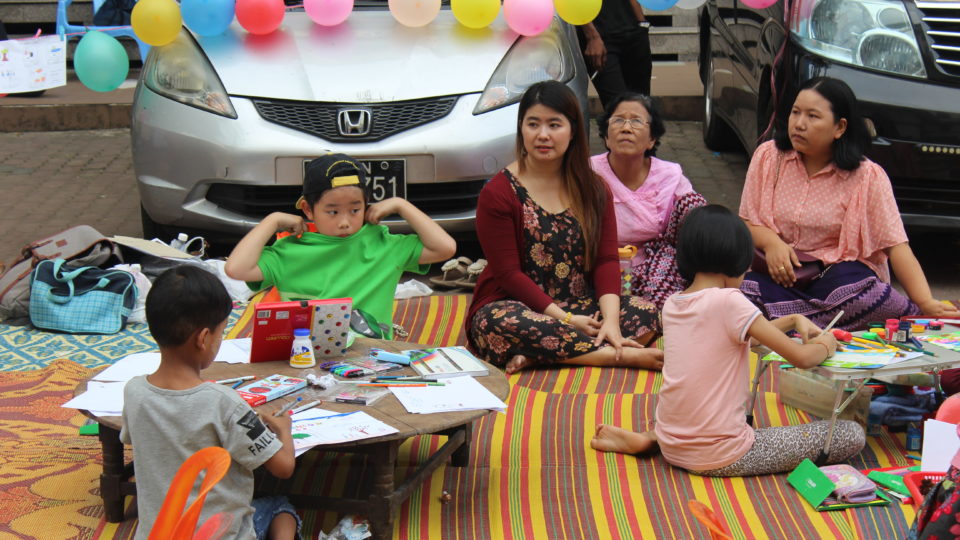Ever wonder what your fellow urbanites think about the city that they live in? A new survey by the Asia Foundation takes a first stab at figuring out what Myanmar’s cities are like as places to work in and live in.
In partnership with the Yangon School of Political Science, the City Life Survey Project surveyed 1,400 participants from five different religious groups and 23 ethnic groups in the urban wards of five townships in Yangon, Hpa-an and Taunggyi.
The survey asked participants about eight aspects of urban life: city livability, wellbeing, gender, work and economic opportunities, quality of government services, tax attitudes, identity and community, and their overall outlook on the direction of their country or city.
Here’s what it found:
City Livability
Participants were happy with their city’s amenities with 73 percent agreeing that their cities had a wide range of entertainment options and 90 percent agreeing that their cities had great options for shopping. However, a little under half of the participants reported that they had the free time to enjoy all the things the city had to offer.
The majority of Yangon residents relied on public transportation (89 percent of trips in Yangon were either public or by foot or bike), whereas the less urbanized Taunggyi and Hpa-an relied heavily on private motorbikes because of the lack of access to public transportation.
Across the board, participants were concerned about traffic safety, with 54 percent reporting that they were concerned for their own safety when riding a motor vehicle in their city.
Wellbeing
Participants gave generally positive responses when asked about their happiness, health, anxiety, and overall satisfaction with life, but there were big differences between the cities. Taunggyi reported the highest level of wellbeing across the board, with Hpa-an reporting the lowest.
Gender
Although there was no discernable difference between men and women in terms of achievements in education, women’s participation in the labor force is significantly lower than that of men, while their time spent on unpaid domestic duties is significantly higher.
Half of the women surveyed reported that they do not work, compared to 27 percent of men. The domestic work gap is significant: 27 percent of women worked between six and 10 hours of housework, and 14 percent worked 11 to 15 hours. For men, these numbers were only 12 percent and three percent, respectively.
Work and Economic Opportunities
When asked whether their financial situation has remained the same or gotten better, a little over half of respondents reported that nothing has changed, and a little over a quarter of respondents reported that their situation was improving. Additionally, about three quarters of people surveyed reported that their household earnings were less than K350,000 (US$262) per month.
When asked whether they believe in the value of hard work, 80 percent of respondents agreed that they could get ahead through perseverance.
Quality of Government Services
Government that citizens directly engage with, like schools, universities, roads, parks, and markets, all received positive reviews. Less-visible services, on the other hand, like sewage, pipes, and drainage, received greater criticism. More than 70 percent of participants recognized an improvement in their cities’ electricity supply.
Although many still perceive their ability to influence the Development Affairs Organizations (DAOs) and the Yangon City Development Committee (YCDC) as low, many responded that these agencies have become more responsive in the recent past.
Tax Attitudes
Although the majority of respondents don’t pay income or commercial tax, more than half reported paying property tax. This gap is not because respondents were anti-tax; in fact, they recognized it as a civic duty and viewed income, commercial and property taxes as fair. Many wished there was more information about which taxes to pay and that the government was more transparent about where their tax money went.
Given that many urban residents share a common civic understanding about taxes, it is no surprise that more than 80 percent of respondents expressed a willingness to volunteer to support a government initiative to help their cities.
Identity and Community
While many respondents said they have close ties with their neighbors, they had low levels of trust with their broader community, particularly if they were from different religious or ethnic groups.
Nonetheless, 93 percent of respondents said they feel close to people in their neighborhood, and 62 percent said they feel that most people in their city can be trusted.
Outlook
While Myanmar’s urban residents are generally optimistic about the direction the city and country are heading in, there are many problems facing city planners and residents: traffic congestion, access to public transportation, and gender disparities in work opportunities.
As Myanmar opens its doors after decades of isolation, urbanization is expected to speed up as well. By most estimates, Yangon will become one of the fastest growing cities in Asia.
According to the report, policy makers and urban planners who listen to people’s voices will make more livable, accessible cities for Myanmar.




